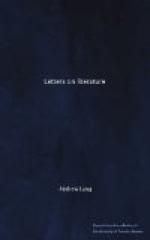“To all you ladies now on
land
We men at sea
indite.”
They are all alike, the wits of Queen Anne; and even Matt Prior, when he writes of ladies occasionally, writes down to them, or at least glances up very saucily from his position on his knees. But Prior is the best of them, and the most candid:
“I court others in verse—but
I love thee in prose;
And they have my whimsies, but thou
hast my heart.”
Yes, Prior is probably the greatest of all who dally with the light lyre which thrills to the wings of fleeting Loves—the greatest English writer of vers de societe; the most gay, frank, good-humoured, tuneful and engaging.
Landor is great, too, but in another kind; the bees that hummed over Plato’s cradle have left their honey on his lips; none but Landor, or a Greek, could have written this on Catullus:
“Tell me not what too well
I know
About the Bard of Sirmio—
Yes, in Thalia’s
son
Such stains there are as when a
Grace
Sprinkles another’s laughing
face
With nectar, and
runs on!”
That is poetry deserving of a place among the rarest things in the Anthology. It is a sorrow to me that I cannot quite place Praed with Prior in my affections. With all his gaiety and wit, he wearies one at last with that clever, punning antithesis. I don’t want to know how
“Captain Hazard wins a bet,
Or Beaulieu spoils
a curry”—
and I prefer his sombre “Red Fisherman,” the idea of which is borrowed, wittingly or unwittingly, from Lucian.
Thackeray, too careless in his measures, yet comes nearer Prior in breadth of humour and in unaffected tenderness. Who can equal that song, “Once you come to Forty Year,” or the lines on the Venice Love-lamp, or the “Cane-bottomed Chair”? Of living English writers of verse in the “familiar style,” as Cowper has it, I prefer Mr. Locker when he is tender and not untouched with melancholy, as in “The Portrait of a Lady,” and Mr. Austin Dobson, when he is not flirting, but in earnest, as in the “Song of Four Seasons” and “The Dead Letter.” He has ingenuity, pathos, mastery of his art, and, though the least pedantic of poets, is “conveniently learned.”
Of contemporary Americans, if I may be frank, I prefer the verse of Mr. Bret Harte, verse with so many tunes and turns, as comic as the “Heathen Chinee,” as tender as the lay of the ship with its crew of children that slipped its moorings in the fog. To me it seems that Mr. Bret Harte’s poems have never (at least in this country) been sufficiently esteemed. Mr. Lowell has written ("The Biglow Papers” apart) but little in this vein. Mr. Wendell Holmes, your delightful godfather, Gifted, has written much with perhaps some loss from the very quantity. A little of vers de societe, my dear Gifted, goes a long way, as you will think, if ever you sit down steadily to read right through any collection of poems in this manner. So do not add too rapidly to your own store; let them be “few, but roses” all of them.




